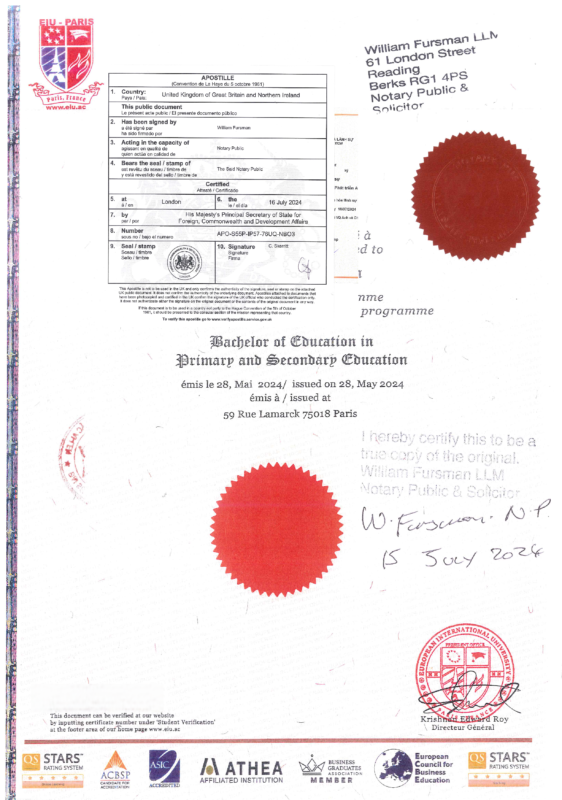 Legalizing your TEFL (Teaching English as a Foreign Language) certificate is essential to validate its authenticity for foreign employers and governments. The process, known as “legalization” or “authentication,” varies depending on the country where your certificate was issued. Below is a step-by-step guide tailored to specific countries, followed by a summary highlighting the differences between each nation’s procedures.
Legalizing your TEFL (Teaching English as a Foreign Language) certificate is essential to validate its authenticity for foreign employers and governments. The process, known as “legalization” or “authentication,” varies depending on the country where your certificate was issued. Below is a step-by-step guide tailored to specific countries, followed by a summary highlighting the differences between each nation’s procedures.
Step 1: Determine the Country of Issuance
Legalization must be conducted in the country where your TEFL certificate was issued. For example, if your certificate was issued in the UK, you need to legalize it through the UK government. This principle applies universally, so ensure you follow the procedures specific to the country of issuance. But if you take the TEFL in country then it needs to be validated by your country.
Step 2: Certification by a Notary Public
Before legalization, a notary public or solicitor must certify that your TEFL certificate is genuine. Notaries are available worldwide; search for “notary public” in your local area to find one nearby. The notary will inform you of the necessary documents required to certify your qualification.
Step 3: Legalization Process by Country
Once your TEFL certificate is notarized, proceed with the legalization process specific to the country of issuance:
United Kingdom:
- Apply for Legalization:
- Visit the UK government’s official website:
- Select “Start a standard application” and choose “Educational certificate (UK)” from the document options.
- Provide your personal details, return address, and contact information.
- Submit Documents:
- Send your notarized TEFL certificate along with the order confirmation to the Legalization Office.
- Use a reliable courier service, such as Royal Mail’s Special Delivery, for both sending and receiving documents.
- Processing Time:
- The standard service typically takes 2 to 10 business days.
Ireland:
- Apply for Legalization:
- Visit the Department of Foreign Affairs and Trade’s website:
- Follow the instructions for authenticating educational documents.
- Submit Documents:
- Provide your notarized TEFL certificate as per the guidelines.
- Processing Time:
- Processing times may vary; consult the website for current estimates.
United States:
- State-Level Authentication:
- Contact the Secretary of State’s office in the state where the TEFL provider is located.
- Follow their specific procedures for document authentication.
- Federal Authentication (if required):
- After state authentication, submit the document to the U.S. Department of State for an apostille.
- Processing Time:
- Processing times vary by state; check with the relevant office for details.
Canada:
- Provincial Authentication:
- Contact the official document authentication service in the province where your TEFL certificate was issued.
- Federal Authentication:
- After provincial authentication, submit your document to Global Affairs Canada for an apostille.
- Processing Time:
- Processing times vary; consult the respective offices for current information.
Australia:
- Apply for Legalization:
- Visit the Australian Government’s Smartraveller website:
- Follow the instructions for authenticating educational documents.
- Submit Documents:
- Provide your notarized TEFL certificate as per the guidelines.
- Processing Time:
- Processing times may vary; consult the website for current estimates.
New Zealand:
- Apply for Legalization:
- Visit the New Zealand Department of Internal Affairs website:
- Follow the instructions for authenticating educational documents.
- Submit Documents:
- Provide your notarized TEFL certificate as per the guidelines.
- Processing Time:
- Processing times may vary; consult the website for current estimates.
South Africa:
- Apply for Legalization:
- Visit the Department of International Relations and Cooperation’s website:
- Follow the instructions for authenticating educational documents.
- Submit Documents:
- Provide your notarized TEFL certificate as per the guidelines.
- Processing Time:
- Processing times may vary; consult the website for current estimates.
Step 4: Receive the Apostille Certificate
After processing, your TEFL certificate will have an apostille attached, confirming its legalization. This ensures your certificate is recognized in countries that are signatories to the Hague Apostille Convention.
Step 5: Additional Authentication for Non-Hague Convention Countries
If you plan to work in a country that is not a member of the Hague Apostille Convention, you may need further authentication from the destination country’s embassy or consulate. Always verify the specific visa and document requirements in advance.
Summary of Differences Between Countries:
- United Kingdom and Ireland: Legalization is handled by the respective government departments, with a standard processing time of 2 to 10 business days.
- United States and Canada: The process involves both state/provincial and federal authentication, which can be more time-consuming due to multiple steps.
- Australia and New Zealand: Legalization is managed by their respective government departments, with processing times varying based on current workloads.
- South Africa: The Department of International Relations and Cooperation handles legalization, with processing times subject to change; it’s advisable to consult their website for the most up-to-date information.

